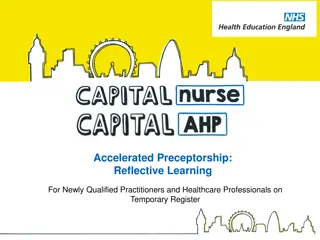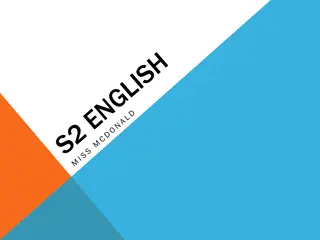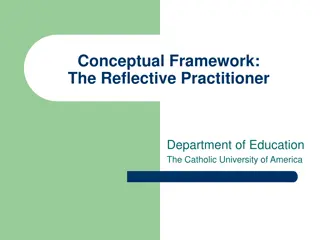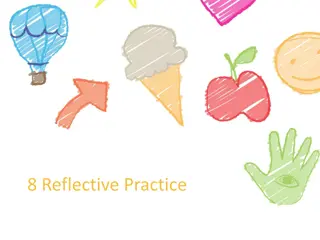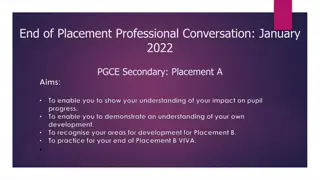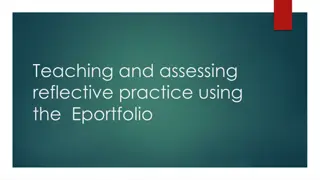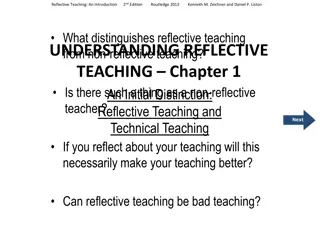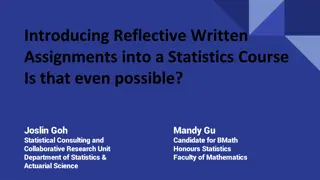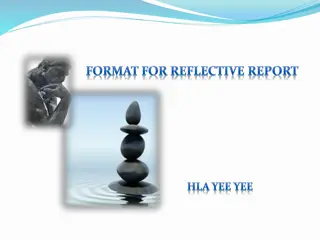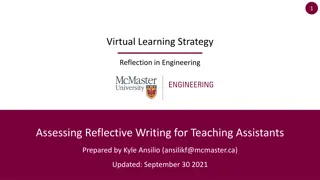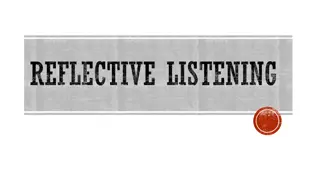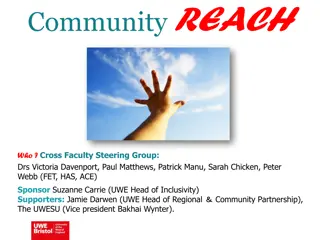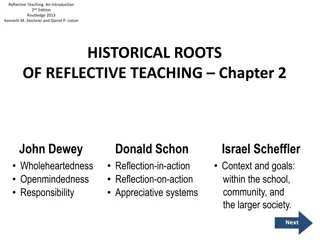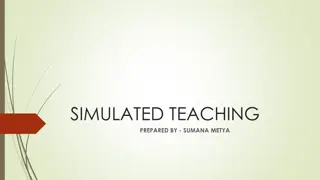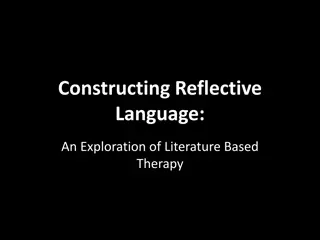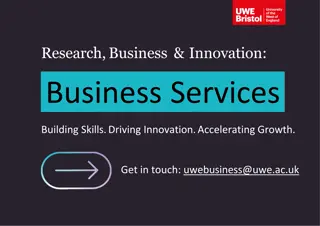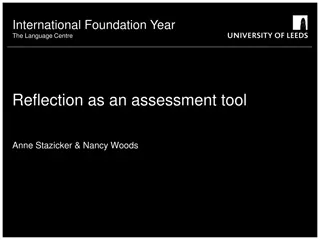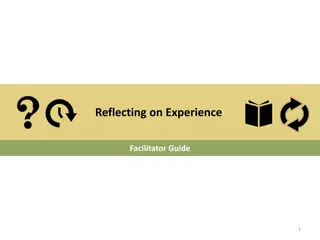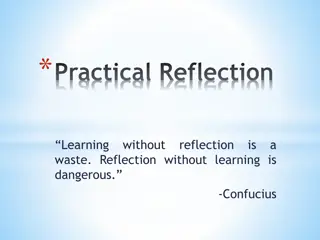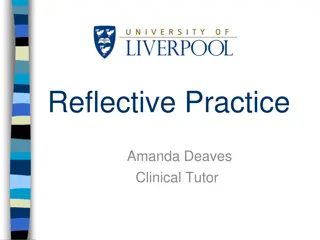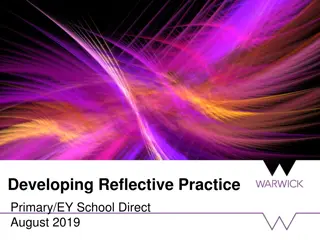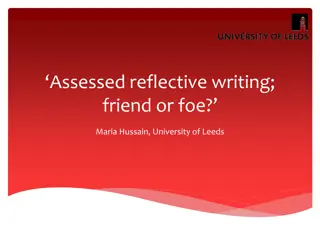Exploring Reflective Practice in Learning & Teaching at UWE
The collaborative enquiry at UWE delves into the use of reflective practice in various professional courses, highlighting challenges and the importance of reflective capacity. A diverse group engages in iterative cycles of input, conversation, reflection, and refreshments to benchmark and enhance reflective practices for life-long learning.
Download Presentation

Please find below an Image/Link to download the presentation.
The content on the website is provided AS IS for your information and personal use only. It may not be sold, licensed, or shared on other websites without obtaining consent from the author. Download presentation by click this link. If you encounter any issues during the download, it is possible that the publisher has removed the file from their server.
E N D
Presentation Transcript
Developing The Reflective UWE Student - a collaborative enquiry Benchmarking the use of reflective practice in learning & teaching at UWE Rachel Wood (LAW) James Burch (ABE)
Our own Pedagogical Challenges teaching reflective practice is neither obvious or easy . (Casey, 2014) it never quite works for them. (Wong, 2016) whilst it has been expedient to adopt Sch n s theories they have done so without sufficient understanding of their theoretical limitations and methodological errors; their cracks , boundaries and blurs (Webster, 2008)
UWE Context Wide range of professional courses all with reflective practice Education Radiography Oncology Marketing Architecture Academic Skills Teaching Midwifery Leadership & Management Journalism Natural Sciences Engineering Accountancy Fine Art Games Technology Conservation Education Law Geography Social Work Psychology But all different approaches, intentions and intended outcomes
Collaborative Group for the day Seventeen participants across all four Faculties: Claire Bennett Sara Bird James Burch Jackie Chelin Stephen Hunt Janette Chianese Gareth Edwards Myra Evans Wendy Fowles-Sweet Lynne Lawrence Ursula Lucas Gillian Ottley Phaik Tan Mike Ricketts Simon Scarle Amanda Webber Rachel Wood
Process: a collaborative enquiry Iterative cycle of: INPUT : CONVERSATION : REFLECTION : REFRESHMENTS Four iterations of this cycle asking: WHAT WE DO? WHY WE DO IT? WHAT WORKS WHAT DOESN T WORK (particularly assessment)? WHAT WE DON T KNOW (& would like to do next) In order to develop a co-authored report to benchmark the use of reflective practice in learning & teaching at UWE
Having a reflective capacity is essential for life-long learning. It affects one s personal/ professional/ work/ life, i.e. it affects all aspects of one s being. Phaik Tan, Accounting (FBL)
What do we mean when we talk about reflection? Can we do more to sell reflective ability as a life skill, something that employers will value, as a skill where individuals curate their own career progress and evaluate and learn as they go along, rather than relying upon others to do this for them? Asking WHY alongside WHAT, HOW and WHEN; learning from what s done and related impact to help identify what to do and related implications both professionally and personally. Wendy Fowles-Sweet, Engineering (FET) Sara Bird, Marketing (FBL) Taking forward the learning from an experience to improve skills and ultimately practice. Reflection can lead to increased self-awareness and increased receptiveness to change. Practitioners should feel empowered to action change/ to improve practice Could also be potentially linked to improved personal resilience? I guess my definition of reflection in these modules is for students to step outside their experiences inside and outside the classroom and look back on how they are experiencing the input of knowledge and what this means for them as a practicing manager. Gareth Edwards, Business and Management (FBL) Janette Chianese (HAS)
Why are we using reflection with students? Our students are doing a programme which leads to professional qualification. Part of the standard requires them to be a reflective practitioner. Perhaps above all, art academics see themselves as aiming to create a varied, stimulating and open- ended learning environment, in which students develop their own self-directed work, which involves regular self-reflection, evidenced in a variety of ways. Students, their tutors and peers reflect together, regularly, on new work, issues and ambitions, as these emerge and develop. Claire Bennett, Radiography and Oncology (HAS) The link between reflective writing employability most professional bodies expect or require an element of reflective practice and writing as an integral aspect of their professional practice. Mike Ricketts, Fine Art (ACE) Traditionally leadership development has been wrapped up in personal development and hence the link to reflection and reflective practice. Stephen Hunt, (Library Services) Gareth Edwards (FBL)
Beyond immediate professional requirements It can be useful, yet tricky in journalism education to embody the true meaning of reflection. Our BA journalism is accredited by the Broadcast Journalism Training Council which stipulates a long list of requirements and skills that students have to achieve. Whilst these skills are useful in preparing students to do the job there are no requirements for reflection on this practice. This can sometimes jar with the requirements of a degree, for the students to be critical thinkers. We try very hard to embody both the training element of the degree and the academic critical thinking element and encourage students to see the overlaps. Myra Evans, Journalism (ACE)
What are we doing? Extended reflective activity includes Individual activities include including Learning logs Reflection on a mock conversation with a patient Learning diaries/journals Shut up and write sessions Portfolios (including PebblePad) Reflection on a specific change/event experience Sometimes the whole artefact is assessed, sometimes it provides raw material for a shorter assessment piece. Post mortem industry style report on a development project
What are we doing? Reflecting with others . reflection as a collaborative activity Reflection as assessment Reflection supporting other forms of assessment Clinical debriefing sessions (HAS) Within the cycle of classroom learning (FBL) The experience of working on group presentations (Business and Management) Contextual and critical discussion woven into studio work (ACE) The process of producing academic work (Law and Business and Management)) Work-based learning days critical reflection with practitioners (HAS) One to one dialogues with practitioner-tutors and visiting artists/art professionals (ACE)
How are we doing it? External stimuli (strangemaking) PROBLEMS OF: Disciplinary bias Discussion of images (HAS & FBL) the actual term reflection would have them running a mile(FET) Skills matrix review (FET/EDM) Discussion of experiential evidence (HAS) Cultural bias Tick Box Reflection Deconstructing experiential learning (Law) cobbled together at the end(FBL) Building on knowledge time travel reflection (FET) Session debrief, feedback as reflection (Library) Admission of vulnerability students are fearful of admitting failure or getting something wrong and are less likely to admit in their reflections when it happens in fear of getting a lower mark (ACE) One-to-one tutee/tutor discussion (HAS) Using a reflective model or using broader reflective philosophy/theories (HAS)
Conclusions Reflection as a life skill Reflection as central to professional learning see how they behave in situations, how their behaviour affects others, what they do well and areas they can make improvements(HAS) Challenging and supporting art students to reflect on their work and practice, and their identities as artists , is fundamental to HE- level art education. (ACE) Threshold moments informed by reflection are central to this professional development.(FET) Reflective practice as a catalyst for learning helping students to work through barriers even enabling them to mature.(FBL) I would like to know if there is a core set of texts / journals, models, etc that can give me a more solid foundation to the subject This is what distinguishes a practice-based degree from a pure training course. (ACE)
Conclusions Any questions?
References Boud, D. & Walker, D. 1998, "Promoting reflection in professional courses: The challenge of context", Studies in Higher Education, vol. 23, no. 2, pp. 191-206. Casey, T. (2014), "Reflective practice in legal education: the stages of reflection", Clinical Law Review, vol. 20, no. 2, pp. 317. Dewey, J. (2010), How we think, [Facsim.]. edn, BN, U.S. Gibbs, G. (1988) Learning by Doing: A guide to teaching and learning methods. Oxford: Oxford Polytechnic Further Education Unit. Kolb, D.A. (2015), Experiential learning: experience as the source of learning and development, Second edn, Pearson Education, Upper Saddle River, N. J. Macfarlane, B. & Gourlay, L. (2009), "The reflection game: enacting the penitent self", Teaching in Higher Education, vol. 14, no. 4, pp. 455-459. Mezirow, J. (1990), Fostering critical reflection in adulthood: a guide to transformative and emancipatory learning, Jossey- Bass, San Francisco, CA. Sch n, D.A. (1987), Educating the reflective practitioner: toward a new design for teaching and learning in the professions, Jossey-Bass, San Francisco. Webster, H. (2008), Architectural Education after Sch n: Cracks, Blurs, Boundaries and Beyond , Journal for Education in the Built Environment, 3:2 pp.63-74 Wong, A.C.K. (2016) Considering Reflection From the Student Perspective in Higher Education. SAGE Open. 6 (1), pp. 1-9


